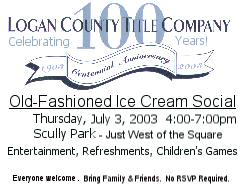|
Mayor Beth Davis invited Kenneth Gray
to attend the meeting. Gray runs a salvage operation that picks up
large appliances and scrap metal from local homes and businesses. He
uses a pickup truck to collect the salvage and then transfers the
items to a large transport truck at his residence. When the large
truck is full, which is usually every two days, he delivers the
materials to a salvage yard in Peoria.
Gray says he feels that he is being
harassed and intimidated by Leslie Last, who works for the city,
when Last drives past his home and takes pictures. Last's job is to
assure that city ordinances are followed.
The Grays feel that they provide a
service to the city. Mr. Gray also believes that he is being singled
out by Last. Gray named several other people that in his opinion are
in violation of the zoning ordinances like what he is being charged
with. He pointed out that in his same neighborhood a semi truck
driver parks his truck and keeps it running by computer.

Recognizing that a truck piled with
scrap is not an appealing sight and wanting to be good neighbors,
the Grays offered to daily cover its contents with a tarp. They
asked the council if they could continue to park their truck in
their driveway.
Gray continued to say that he felt that
Last was discriminating against him.
Several councilmen pointed out that the
issue should not be a personal one between Gray and Last. The issue
is about zoning. The Grays live in a residential area and cannot run
a business from their residence. Bill Bates, the city's attorney,
asked Gray if the phone number on his business card was his home
phone number. Gray indicated that it was.
Councilman Prather pointed out that the
council could not start a practice of changing zoning ordinances for
people. The bantering over the issue continued for quite a while.
Mr. Gray finally thanked the mayor for
letting them present their concerns and left in frustration.
The council continued to discuss the
Grays' request and concerns after they left. They looked closely at
the examples of other people violating zoning ordinances that Mr.
Gray had pointed out. Many of these examples are of people who live
in light industrial districts, such as South Kickapoo Street.
The council tried to come up with ways
that Gray's concerns could be addressed. The bottom line is that he
runs a business in a residential zone, council member Martha Nietzel
said. Bates said those zoning ordinances do not leave you any room
for compromise.
Council member Jonie Tibbs expressed
her understanding of Gray's concerns.
Council members said they appreciated
the service that Mr. Gray provides and that he does a good job. Many
members spoke in support of Leslie Last and said that it was Last's
job to check on zoning violations and to take pictures of residences
that are in violation. They said you deal with this kind of issue as
it comes up. You can't go out and resolve every zoning violation all
at once. The council also agreed that zoning issues all had to be
addressed and treated equally, which they felt Last did.

The mayor said that she would like to
see a resolution to this matter, and the council agreed to continue
to study it.
The next issue addressed by the council
was a letter sent to Jonie Tibbs by Mr. and Mrs. Barry Miller. The
letter addressed a concern about people not picking up after their
pets. The Millers live in Park Place and indicated that recently
people had worked together to beautify the neighborhood. They felt
that people were irresponsibly not picking up after their pets when
the pets relieve themselves.
The Millers pointed out that recently
signs have been posted at Kickapoo Creek Park informing people that
they need to pick up after their pets. They wanted the council to
consider posting signs in city neighborhoods, on boulevards in
particular.
The council discussed this request at
length, as it has been presented previously and continues to be an
issue that doesn't get better. Alderman Prather said that some city
ordinances are impossible to execute.
[to top of second column in
this article]
 |

Bates suggested a way that violations
of the ordinance could be executed. He said that a third-party
witness would need to come forward, fill out a witness report and be
willing to testify in court. This would then be given to Leslie Last
to look into. If a violation was found, charges could be filed.
The council felt that it would be
impossible to post copies of city ordinances in all the
neighborhoods. Councilman Fuhrer suggested that people be given a
copy of the ordinance when they register their pets at Logan County
Animal Control each year. The council will explore this idea
further.
Councilwoman Tibbs reported on an
animal control committee meeting that she attended. In a one-month
period the shelter had taken in 115 animals, 98 of them from
Lincoln. Animal Control is running $828.17 short of what they need
for the month. Tibbs was impressed by the work efforts at picking up
and caring for so many animals, but she is shocked at how
irresponsible people are with their pets.

Alderman Glenn Shelton indicated that
there would be work done at the Keokuk railroad crossing, beginning
at 7 a.m., from Monday, June 30, through Thursday, July 3. Mark
Mathon, city engineer, said he spoke with Union Pacific and they
will be supplying the detour signs. At his recommendation the detour
will use state routes rather than local streets. Traffic will be
rerouted to old Route 66 (Lincoln Parkway) all the way around to
where it intersects with Woodlawn Road.
Police Chief Richard Montcalm made a
recommendation of how the city might keep up its vehicles during
tight times. He has done some research and spoken to several local
car dealerships about what is available. He has a plan so that the
city would not have to spend any money.
Chief Montcalm said he would like to
trade in a 1996 Caprice squad car with 147,000 miles and the DARE
van that has 58,000 miles for a new vehicle. The 2003 car would not
be fully equipped. It would have police lights and minimal
equipment. That would become the administrative vehicle he would
drive. The car he currently drives is fully equipped and has only
19,000 miles. It would move into the fleet of police cars.
With this plan the city would not have
to pay as much insurance, and they would have better cars with less
mileage. The council felt that the chief's plan was a good one. They
said that they were top-heavy in cars at this time. The council did
recommend that Chief Montcalm get proposals from all three Lincoln
car dealers before making a trade. He said that is what he intended
as that is where our tax base is.
Councilwoman Neitzel reported that the
city's insurance is in place for the sesquicentennial. The city must
assure that establishments participating in events have insurance
and that any fireworks company participating must also have
insurance.
Neitzel also reported that the fire and
police departments' training procedures have been professionally
reviewed and that it was reported that the departments are doing a
good job, especially in light of recent cutbacks and a minimal work
force.
It was recommended that the city
purchase training tapes for the fire and police department employees
to view. The council agreed. The fire and police chiefs have plans
to use those tapes and implement applicable recommendations from
them.
Councilman Prather reported that the
public meeting to go over appropriations for city departments would
be at 7 p.m. on July 21.
Councilman Crane gave a brief report on
plans that the city has to commemorate and honor several historic
buildings and homes in Lincoln. Plaques will be given to certain
residents for keeping up homes and buildings that have historical
significance.
A pamphlet that is nearly ready for
distribution will define the specifications for the honor. The
buildings and homes must be 75 years old. This is being done in
conjunction with the sesquicentennial and is at no cost to the city.
Alderman Armburst also indicated that a
plaque will be presented to the Kickapoo Park Creek Park on July 7.
The city
council will meet again on Monday, June 30.
[Don
Todd] |